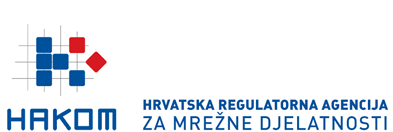HAKOM put into operation a new upgrade of the interactive portal with the broadband speed usage mapRESS RELEASEHAKOM’s interactive portal has been upgraded with a new topic of the “Broadband Speed Usage Map”. The purpose of this upgrade is to supplement the broadband mapping project with data necessary for the drafting of projects for the development of broadband access networks to be financed from the EU funds and for the fulfilment of Digital Agenda objectives at the level of towns and municipalities or neighbourhoods of the city of Zagreb.
ZAGREB, 12 December 2014 – The upgraded Interactive portal with the broadband speed usage map will be publicly available to all interested citizens on HAKOM’s website as of today. The map includes an overview of data on contracted speed (2 Mbit/s and higher), fixed broadband take up rate, and data have been presented in the form of an interactive map down to the lowest levels of local self-government. The upgrade of the Interactive portal with the new topic of “Broadband Speed Usage Map” represents a new functionality the purpose of which is to assist local self-government units in the analysis of broadband speed usage in their territory. This will enable the monitoring of the fulfilment of objectives of the Digital Agenda at the level of cities and municipalities in Croatia and neighbourhoods of the city of Zagreb and the identification of efficiency of use of state aid and assistance from the EU funds.
Link to the Interactive portal: http://bbzone.hakom.hr/In accordance with the European Union guidelines set out in the Digital Agenda for Europe 2020, the objective of the Agenda is to ensure that by 2020 all households in the European Union will have access to broadband Internet at a minimum rate of 30 Mbit/s and that at least 50% of households will be subscribed to broadband connections of 100 Mbit/s and above. In order for those ambitious objectives to be achieved, it will be necessary to use state aid and assistance from European Union funds for the building of access networks with such access speed. Such aid is available only in areas where next generation networks (NGA) do not exist and where private investors, or operators, have no commercial interest. For that purpose, and in order to assist the local self-government units in the building of broadband access networks, HAKOM launched the first version of the Interactive portal with the broadband availability map one year ago and, in the meantime, the portal has been upgraded with other topics. The portal may be used by units of local self-government and interested investors as a unique tool for proving the justification of aid, which should speed up and facilitate the preparation of projects financed from the European Union development funds. # # # For additional information please contact: Croatian Regulatory Authority for Network Industries (HAKOM) Roberta Frangeša Mihanovića 9 10110 Zagreb, Croatia Tel. + 385 (0) 1 700 70 07 Fax + 385 (0)1 700 70 70 Media inquiries can be submitted online using HAKOM’s official website: Registration required. ABOUT HAKOM: HAKOM (www.hakom.hr) - Croatian Regulatory Authority for Network Industries – ensures preconditions for a fair market competition, stable growth and environment for innovations in the electronic communications and postal services market. HAKOM protects users’ interests and the possibility of choice among various communications and postal services at affordable prices, defines sustainable competitive conditions for operators and service providers under fair conditions for return on investment, and provides support to economic growth, public services and the quality of life in the Republic of Croatia by using modern technologies. HAKOM’ strategic goals are: to promote regulation of the electronic communications and postal services market, to support growth of investments and innovations in the electronic communications and postal services market, to provide efficient use of limited resources, to accelerate the growth of broadband products and services, to provide affordable offers of communications and postal services, to provide protection and informing of users, to build an efficient and comprehensive information system, to define and implement efficient processes, and to acquire multi-disciplinary competencies in market regulation. |
 |
|
|